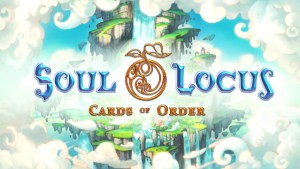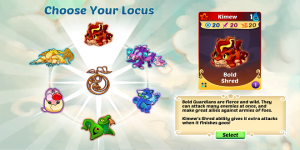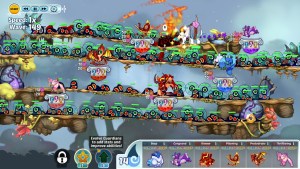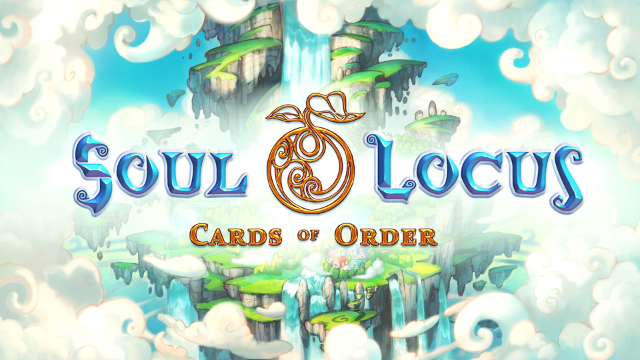 |
|
|---|---|
| Title | Soul Locus: Cards of Order |
| Developer | Fat Loot Games |
| Publisher | Fat Loot Games |
| Release Date | April 30, 2015 (Early Access) |
| Genre | Tower Defense |
| Platform | PC |
| Age Rating | N/A |
| Official Website | |
I’ll be honest. When I saw that Soul Locus: Cards of Order claimed to be a cross of Pokémon and tower defense, and that it did all this with a side of card collecting, I was skeptical. The marketing materials are similar to the kinds of things I see on a lot of common mobile games, so I didn’t expect much. Still, I can say that I’ve been pleasantly surprised, if not exactly blown away.
 There is some truth to what is said about this game: it is a true tower defense game, featuring Pokémon-like creatures called Guardians that are stored on cards. You have to defend, of all things, a large ox that presumably carries your stuff. Along the path, where the enemy goo creatures approach, there are pedestals that you can place your Guardians on, and they will start shooting at the goo. Simple, right?
There is some truth to what is said about this game: it is a true tower defense game, featuring Pokémon-like creatures called Guardians that are stored on cards. You have to defend, of all things, a large ox that presumably carries your stuff. Along the path, where the enemy goo creatures approach, there are pedestals that you can place your Guardians on, and they will start shooting at the goo. Simple, right?
There are six types of Guardians. The first four have special attack effects: slowing enemies, poisoning them, cutting their defense, and splash damage, respectively. Many of the goo creatures will resist the majority of attacks and have some special weakness to one of these types, though their effects are useful against all enemies. The fifth type gets a boost in both attack and range every time it kills an enemy, so it can potentially become many times stronger than its normal limit (though its attack speed tends to be very poor). Finally, the last type specializes in gathering Focus for you.
 Focus is used for just about everything during a battle. Normally, it accumulates very slowly, although there are occasional Focus crystals that appear on screen, which you can click to get a little Focus. Adding a Guardian to the stage requires Focus, as do any upgrades you might wish to give it. You can increase a Guardian’s speed, strength and range considerably, but every point you’ve spent on this for that Guardian will increase the cost. So, for example, if you’ve already maxed out a Guardian’s speed, it will cost a lot to buy even a small upgrade in range.
Focus is used for just about everything during a battle. Normally, it accumulates very slowly, although there are occasional Focus crystals that appear on screen, which you can click to get a little Focus. Adding a Guardian to the stage requires Focus, as do any upgrades you might wish to give it. You can increase a Guardian’s speed, strength and range considerably, but every point you’ve spent on this for that Guardian will increase the cost. So, for example, if you’ve already maxed out a Guardian’s speed, it will cost a lot to buy even a small upgrade in range.
Some Guardians can also be evolved, depending on their rarity. A common Guardian can’t be evolved, but an uncommon or rare one can be evolved once or twice, respectively. At the highest level, the Soul Locus level, these special guardians have four forms. However, in any given battle your Guardians will start in their first form, and you’ll have to use the evolve button each time you want to evolve any of them — and this technique, too, increases in cost. Unlike normal stat upgrades, this carries over to all Guardians so that the last one you evolve will cost much more than the first.
 At the beginning of the game, you’ll get the common Guardians of each of the six types, and you’ll also have a choice of the Soul Locus of any type. This one will obviously outclass the others for quite some time, but luckily you can craft more Guardians to start balancing your team out. Each Guardian type also has three levels of craft items to create new cards. Combine two of the same type with one of a different type, and you’ll get a Guardian of the dominant type, based on the levels of the items. Three of the same item will create the next level of item, and three of the highest level spit out a Soul Locus card of that type. (Three different items make a random Guardian.)
At the beginning of the game, you’ll get the common Guardians of each of the six types, and you’ll also have a choice of the Soul Locus of any type. This one will obviously outclass the others for quite some time, but luckily you can craft more Guardians to start balancing your team out. Each Guardian type also has three levels of craft items to create new cards. Combine two of the same type with one of a different type, and you’ll get a Guardian of the dominant type, based on the levels of the items. Three of the same item will create the next level of item, and three of the highest level spit out a Soul Locus card of that type. (Three different items make a random Guardian.)
 Every battle gives you a few of the crafting items, as well as some money that you can use to buy more (quite expensively) at the shop. When the developer adds in quests, as they apparently plan to, I expect there will be even more of the items as rewards. And this is one of the problems I have with this game. Each type seems to have a couple of common cards, a couple of uncommon cards, a single rare and a single Soul Locus. If it really wanted to be, in part, the next Pokémon, as its Steam page claims, it would be an interesting decision to make different teams. But actually, you’ll probably create a handful of uncommon or rares to get you through, then quickly get to the point where you can craft a Soul Locus. With only a few hours of gameplay, I was able to get a Soul Locus of all six types–after which, what is the point of using any other Guardians at all? The crafting items are now piling up uselessly in my inventory.
Every battle gives you a few of the crafting items, as well as some money that you can use to buy more (quite expensively) at the shop. When the developer adds in quests, as they apparently plan to, I expect there will be even more of the items as rewards. And this is one of the problems I have with this game. Each type seems to have a couple of common cards, a couple of uncommon cards, a single rare and a single Soul Locus. If it really wanted to be, in part, the next Pokémon, as its Steam page claims, it would be an interesting decision to make different teams. But actually, you’ll probably create a handful of uncommon or rares to get you through, then quickly get to the point where you can craft a Soul Locus. With only a few hours of gameplay, I was able to get a Soul Locus of all six types–after which, what is the point of using any other Guardians at all? The crafting items are now piling up uselessly in my inventory.
 The way I got to that point was first by playing most of the game’s 24 designed levels. These go in linear order, have their own unique pathways, and emphasize different types of enemies. Most of them also limit the number of cards you can bring to around 2-4. After I got stuck on one of those, however, I tried one of the two Endless maps, which were unlocked all along. These missions allow you a full set of 6 cards and let you play for as long as you can hold up, giving you rewards based on how far you get. I found that with a basic Guardian placement strategy, I could farm ridiculous amounts of Focus, max out their stats and then just let the game run for dozens of waves. To be fair, these are problems that have always afflicted tower defense games, but it’s worth noting that (for now, at least) Soul Locus hasn’t managed to rise above them.
The way I got to that point was first by playing most of the game’s 24 designed levels. These go in linear order, have their own unique pathways, and emphasize different types of enemies. Most of them also limit the number of cards you can bring to around 2-4. After I got stuck on one of those, however, I tried one of the two Endless maps, which were unlocked all along. These missions allow you a full set of 6 cards and let you play for as long as you can hold up, giving you rewards based on how far you get. I found that with a basic Guardian placement strategy, I could farm ridiculous amounts of Focus, max out their stats and then just let the game run for dozens of waves. To be fair, these are problems that have always afflicted tower defense games, but it’s worth noting that (for now, at least) Soul Locus hasn’t managed to rise above them.
I criticize, but for a basically pure tower defense (that is, not including a hero character that you directly control, like many recent titles), this game is still better than many. The handcrafted levels show a very careful attention to the difficulty curve that I appreciate. Most of them ended with a very close call for me, if not defeat. There is something to be said about the level of tension that Fat Loot Games clearly knows how to work with. Though this game feels very nice and is perfectly playable already, there’s supposed to be a lot more coming including more levels and a storyline, so I do look forward to its future.
Review copy supplied by the developer.




